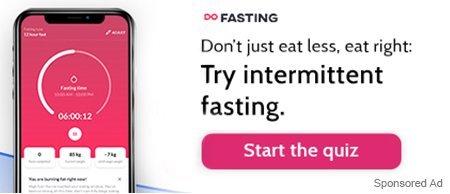What is a 19/5 Intermittent Fast | Science Behind The 19/5 Intermittent Fast | what to eat on 19/5 Intermittent Fast | what not to eat During 19/5 Intermittent Fasting | Benefits of 19/5 Intermittent Fasting | Things to Consider Before Starting the 19/5 Intermittent Fasting
Fasting diets during the past decade have taken the health and fitness industries by storm. You must be living under a rock if you haven’t heard about some of these popular fasting plans claiming multiple health benefits. A simple Internet search will present different ways to follow these plans, like 16/8, 19/5, 5:2, OMAD (one meal a day), alternate day fasting, etc. Let’s dive into the latest trend, 19/5 Intermittent Fasting: A Complete How-To Guide
What is a 19/5 Intermittent Fast?
In simple words, 19/5 intermittent fasting is a time-restricted fasting method that gives you a 5-hour eating window and 19 hours of fasting. Thought has a lot of similarities to 16/8 fasting method, you can say it is an advanced version of the same.
For a layman, choosing the right plan among these can be confusing and cumbersome at the same time. Although all of these diets are based on a similar set of principles, they have some nuances that make them different from each other.
In this article, we aim to provide you with a complete guide to the 19/5 intermittent fasting plan. Read on as we explain the science behind this popular fasting diet and present you with evidence-based benefits related to it. Further, you will find food suggestions to help you get through the fasting period and a list of precautions you must remember while performing this fast.

Just like any other intermittent fasting, in 19/5, you are allowed to consume water and other calorie-free beverages during your fasting window. In fact, experts suggest drinking black coffee and herbal tea can be beneficial.
In this 19/5 intermittent fasting regimen, you can pick a 5- to 6-hour window for eating as per your preference. However, we suggest you not opt for a late-night eating window since it can negatively impact your body’s circadian rhythm and lead to other issues.
A 5-hour eating window will generally allow you to incorporate a single meal daily, and you can only eat again the next day. Hence, we strongly advise you to opt for a nutritionally balanced meal to get the best out of your meals. In the later part of the article, we will provide you with several food item suggestions that can help you with the fast.
Science Behind The 19/5 Intermittent Fast
To better understand how 19/5 intermittent fasting works, you must know how your body reacts to food consumption and staying hungry for long durations.
As we consume food, the digestive system breaks it down into simpler forms. The food passes through the digestive system, where it is broken down and converted into energy. Now it is universal knowledge that glycogen synthesized from food items is our primary source of energy.
The excess glycogen is stored in the liver, from where it can be transferred to different cells and organs to maintain homeostasis. When the available glycogen is surplus to requirement, it is often converted into fat molecules and stored in various fat reserves. This process is the primary reason for weight gain.
During prolonged periods of hunger, our body experiences an energy deficit. To maintain homeostasis, it is forced to look for other energy sources. This is when it taps into the stored fat reserves and breaks them down to produce energy. This process is known as ketosis and is one of the most effective fat-loss methods.
With the 19/5 intermittent fasting plan, you are trying to simulate the above hunger period and trick your body into performing regular ketosis. Apart from fat loss, intermittent fasting has several health benefits, which we will discuss further in the article.

Food Items to Support the 19/5 Intermittent Fast
Since you will have a small 5-hour window to fulfill your daily calorie requirement, it is important to be clever while planning your daily meals. We suggest you have a set menu for the entire week and take time out of your day to prepare meals. It will help you have more control over your nutrition and provide you with quicker results.
Let us look at some food items you must consider while practicing 19/5 intermittent fasting.
Fresh Vegetables
Fresh vegetables are a great source of vital nutrients, vitamins, and fiber. Another benefit of including vegetables is that they are low in calories and high in volume, meaning you can eat more food with fewer calories. French beans, peas, spinach, broccoli, and carrots are popular items you can consider based on taste and availability.
Lean Proteins
Proteins are known to be the human body’s building blocks. As a rule, we suggest you include some protein sources in your healthy daily diet. If you are performing regular exercise while fasting, it is even more important to opt for protein-rich food items. Chicken, Fish, Eggs, Soy, and lean red meat are some of the best forms of protein you can consider.
Fats
The word fats generally is as unhealthy and might make you think of weight gain. However it is essential to understand that fats are needed to protect our organs. They also protect your organs, provide energy and help you absorb nutrients from food. Add more nuts, seeds, olive oil and fatty fish to your diet to reap the benefits of healthy fats.
Black Coffee
Your black coffee without sugar has no calories and if consumed during the fasting window can boost your energy levels. It also acts as a hunger suppressant, and keeps you satiated.
Herbal Teas
In herbal teas there are several options like jasmine, chamomile, and green tea that can be consumed to support fasting. Green tea, in particular, contains a plant-based compound called catechin. Studies suggest that catechins can help relieve the hunger pangs associated with fasting for longer durations.
Water
Consuming healthy amounts of water while fasting is vital, as fasting can lead to dehydration. Additionally, water plays a crucial role in our diet as it helps in blood purification and maintains a normal body temperature.
Electrolytes
While fasting for longer durations, it is normal for the body to lose electrolytes like sodium, calcium, potassium, etc. Hence, it is advised to include some zero-calorie electrolytes during the fasting window for better health.
Food Items to Avoid During 19/5 Intermittent Fasting
Here are some food items that you must avoid while performing the 19/5 intermittent fast.
Processed Foods
Processed and packed food items are filled with unhealthy ingredients and generally tend to contain more calories. While on a 19/5 fasting plan, you already have a small window for food; hence, we suggest you stay away from such unhealthy food items.
Diet Sodas
Although diet sodas contain zero calories, we suggest you avoid them while fasting. Most diet sodas contain aspartame as a primary sweetener, which can interfere with gut health and cause bloating.
Refined Carbohydrates
Food items like pasta, bread, and rice are made up of simple carbohydrates. When consumed, they are quickly digested by your body, which can cause you to feel hungry more often. Additionally, carbohydrate-heavy meals are often the major cause of weight gain and will add to your waist circumference.

Benefits of 19/5 Intermittent Fasting
Let us now look at some of the evidence-based benefits of fasting.
Weight Loss
Weight loss is often one of the primary reasons people take up intermittent fasting. This is because intermittent fasting diets are a great way to target fat loss. The constant cycle of ketosis, which is caused by prolonged fasting, helps the body break down stored visceral fat and convert it to energy.
Alternatively, calorie restriction is another popular method to lose body weight. With intermittent fasting, you can limit your total calorie intake as it is impossible to consume excess calories due to the short eating window. Hence, combining intermittent fasting with regular exercise can effectively help you shed those extra kilos.
Improves Insulin Resistance
Increased insulin resistance means your body is not responding to the insulin present in the blood. It is also known as lowered insulin sensitivity. Unchecked obesity combined with increased insulin resistance are major risk factors for type 2 diabetes.
Fasting regularly for 19 hours will help you maintain a steady blood sugar level and prevent sudden insulin spikes. Studies suggest intermittent fasting can help improve overall insulin sensitivity. It can be an effective way to ward off type 2 diabetes.
Boosts Cardiovascular Health
According to the WHO, heart disease is one of the most common causes of death in modern times. Obesity combined with poor health choices can cause you to develop heart disease. Intermittent fasting is known to positively affect the health markers responsible for good heart health.
These include blood sugar, blood pressure, blood triglycerides, etc. Similarly, it has been found that intermittent fasting can help reduce bad LDL cholesterol and increase the levels of good HDL cholesterol in our bodies. High LDL cholesterol is the major cause of coronary artery disease and stroke.
Reduces Inflammation
Inflammation is part of the body’s immune system and is responsible for fighting diseases and infections. However, increased inflammation for long periods is equally unhealthy as it can cause several autoimmune and chronic diseases.
Increased inflammation can cause the release of free radicals in the body. These free radicals are very harmful, as they can cause damage to the cells and the DNA. Studies have pointed out that fasting can help fight free radicals and reduce harmful oxidative stress.
Promotes Autophagy
Some preliminary studies suggest that intermittent fasting can promote cell repair and autophagy. Autophagy is the process by which the cells of the body start consuming other weak and diseased cells and cell organelles. Fasting for longer periods can cause the weak cells to be broken up and metabolized by other cells, the consumed cells are then replaced by new healthy cells.
Reverses Aging
Some scientists believe intermittent fasting can help slow down the overall aging of our bodies. It is believed that DNA health is directly responsible for cellular aging, and fasting has been shown to have positive effects on DNA health. Similarly, inflammation also plays a role in the aging process. By fasting regularly, you can maintain inflammation levels, which can help prevent disease and slow the overall aging process.
May Prevent Cancer
Some animal-based studies have shown that fasting-mimicking diets are responsible for reducing the risk of cancer. Alternatively, some studies prove that fasting-based diets can boost tumor immunogenicity. Simply put, it refers to the ability of the tumor to induce an immune response that can prevent its growth. Additionally, fasting diets have been proven effective in sensitizing tumors to chemotherapy and promoting the enrichment of common lymphoid progenitor cells.
Boosts Brain Health
Brain cells are normally dependent on blood glucose for ATP generation; however, during prolonged fasting periods, the brain cells utilize the ketone bodies released via ketosis. According to some studies, using ketone bodies as fuel may improve brain functioning and slow cognitive decline.
Animal-based studies have shown that intermittent fasting can promote the formation of new nerve cells, which leads to better brain function. Additionally, regular exercise and fasting have been closely linked with synthesizing the brain-derived neurotrophic factor (BDNF) hormone. Low BDNF levels are known to cause depression in adults.
Things to Consider Before Starting the 19/5 Intermittent Fasting Plan
Intermittent fasting is generally fairly easy to follow; however, the 19/5 diet is much more advanced. Hence, it is important to know about the precautions and things you must consider before giving it a go.
Not Recommended for Fasting Newbies
If you are just starting with intermittent fasting, it is better to start with easier diets. Fasting for 19 hours of the day can be difficult for some of you to stick to, and often the first meal will be the only meal of the day. Hence, if you are uncomfortable with single meals daily, skipping this plan is better.
Not for Old & Diseased People
People with underlying health conditions like diabetes, heart disease, asthma, etc., should not try intermittent fasting. Fasting for longer durations can be stressful on the body, and people with these health conditions can aggravate their illness.
Similarly, old people should stay away from any kind of fasting diet. It is natural to lose some muscle mass during old age, and fasting can add to this, leading to even more complications.
Teenagers and Pregnant Women Must Avoid Fasting
The teenagers are in growing phase and require nutreints for both physical and mental development. So, colorie restriction or fasting is generally not advisable unless they are obese and is recommended by a doctor. And the same rule applies to pregnant women or women who are breastfeeding. Fasting may cause complications in them if done without caution.
Intermittent Fasting is Not for People With Eating Disorders
People who are naturally underweight or have trouble putting on weight must not include daily fast days in their lifestyle. Similarly, people with eating disorders are advised to avoid multiple hours of fasting.
To know more read, Can Intermittent Fasting Cause Eating Disorders?
Conclusion – 19/5 Intermittent Fasting
I personally use the 16/8 or 18/6 fasting methods, but you can do 19/5 to maximize the benefits given it is a longer version of fasting, leading to more autophagy, healing, and rest for your digestive system. The longer the better if you can do it I’ve found in my results. Always do what’s best for you, and your schedule when intermittent fasting.
The 19/5 intermittent fast can be an effective way to tackle obesity and improve overall health. Alternatively, people who want to limit food intake can find some success with 19/5 fasting. For best results, you must combine daily exercise with intermittent fasting.
However, fasting for 19 hours can tax the body, and it must only be considered by people accustomed to time-restricted eating. We suggest you review the side effects and consult with a healthcare professional before making any such diet-related changes.











